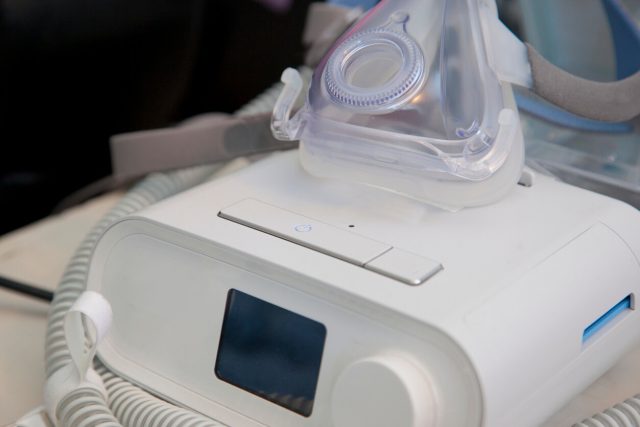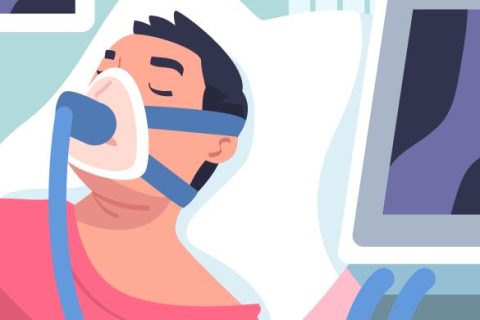Philips CPAP Recall
In 2021 and 2022, Philips Respironics recalled and then replaced certain CPAP, BiPAP and ventilator machines because of health risks from the breakdown of PE-PUR foam. In 2023, the FDA issued a Class I recall for many of the replacements related to faulty programming that can cause injury or death.
See If You Qualify for a Philips CPAP Lawsuit
If you developed cancer or other serious injuries after using a Philips CPAP machine, you may be entitled to compensation. Get a free case review.
- A+BBB Rating
- 4.9 StarGoogle Reviews
- A+BBB Rating
- 4.9 StarGoogle Reviews
Latest CPAP Recall Updates
In 2023, the U.S. Food and Drug Administration issued a Class I recall for certain Philips CPAP and BiPAP DreamStation respiratory devices. This recall followed an earlier 2021 recall for specific models of Philips respiratory devices containing PE-PUR sound abatement foam that could degrade over time. Philips reworked and replaced many of the recalled breathing machines. The current 2023 recall covers these replacement devices.
While working to address the concerns of the original 2021 recall, Philips assigned incorrect or duplicate serial numbers to many of the reworked Philips DreamStation devices during reprogramming. This oversight means users may inadvertently select the wrong factory setting or receive the wrong breathing support prescription. As a result, some of the reworked devices may not provide any therapy at all.
Class I recalls are the most severe type of recall. The FDA chose to designate the 2023 recall as Class I because using the replacement machines can cause respiratory failure, heart failure, serious injury or death.
The FDA also raised concerns about the redistribution of the reworked devices. On its website, Philips claims to have sent out 2,460,000 reworked replacement devices and repair kits, but the FDA has noted that the number of replacement devices is far fewer. This is a concern for those who require breathing support who may be waiting for a device from the company. The FDA encourages people to contact Philips directly for an update if they are waiting for a remediated device.
Why Were Philips CPAP Machines Recalled?
In 2021, Philips recalled certain CPAP and BiPAP ventilator devices out of concern that sound abatement foam within the devices could disintegrate and cause health problems. Over time, the foam can break down into particles and release gases that may increase the risk of cancer or breathing problems.
Certain conditions may have caused the foam in the recalled devices to break down. Devices older than three years or those kept in humid or very hot environments were more likely to have foam disintegration issues.
The 2021 and 2023 Philips CPAP machine recalls have caused severe hardship, illness and fatalities. Between April 2021 and April 2023, the FDA received almost 100,000 complaints about the 2021 recall due to foam disintegration. Users complained of respiratory issues, chest pain, pneumonia, dizziness and infections. Some reports associated the devices with cancer. By the end of 2022, the FDA had received 346 death claims linked to the recalled Philips ventilation machines.
Philips has not replaced all devices recalled in 2021, and many people are still waiting for their new CPAP machines. Some users of the Philips ventilation machines have filed lawsuits against Philips because they have been waiting for years. In addition, some of those who received a new device after the 2021 recall have now had their replacement device recalled in the 2023 recall.
Which CPAP Machines Are Recalled?
The Philips breathing device recalls in 2021, 2022 and 2023 don’t cover all models of CPAP, BiPAP and ventilators. Most recalls are for machines from the Philips DreamStation line, and models by other companies are unaffected, including ResMed CPAP devices.

Philips breathing devices were recalled in 2021 because of disintegration and toxicity risk from the foam in the devices’ airways. In 2022, Philips recalled an additional smaller number of models because of concerns over the toxicity of plastic parts inside the machines. In 2023, Philips recalled some of its models due to programming errors after the 2021 recall. Many were replacements or reworked models from the earlier recall.
- Aeris
- A-Series BiPAP A30
- A-Series BiPAP A40 (ventilator)
- A-Series BiPAP Hybrid A30
- A-Series BiPAP V30 Auto (ventilator)
- C-Series ASV
- C-Series S/T and AVAPS
- Dorma 400, 500, Auto
- DreamStation ASV, Go, ST, Auto and AVAPS
- DreamStation Auto
- E30
- FR REP DreamStation Auto BiPAP, DOM-RECRT
- Garbin Plus
- LifeVent
- OmniLab Advanced Plus
- REMstar SE Auto
- REP DreamStation Auto CPAP, DOM-RECERT
- REP DreamStation Auto CPAP Recert
- SystemOne ASV4, Q-Series, 50 series and 60 series
- Trilogy 100
- Trilogy 200
- Trilogy Evo ventilators
In 2022, the FDA issued a Class 1 recall for magnetic CPAP and BiPAP masks. Using the masks could cause serious injury or death, and they can also interfere with metallic implants. More than 18 million units in the U.S. are impacted by the recall.
- Amara View Full Face Mask
- DreamWear Full Face Mask
- DreamWisp Nasal Mask
- Therapy Mask 3100 NC/SP
- Wisp and Wisp Youth Nasal Mask
Between 2021 and 2023, Philips recalled millions of CPAP, BiPAP and ventilator devices and support accessories. This included 18 models in 2021 for concerns over the sound abatement foam used in the devices. The foam contained carcinogenic chemicals and, in many cases, began to disintegrate, causing users to inhale small pieces or the chemicals in the foam.
In 2022, Philips recalled an additional 1,660 BiPAP ventilator machines because they contained plastic motor parts that could release toxic chemicals or cause the machine to stop working. The company also recalled its magnetic CPAP and BiPAP masks out of concerns they could interfere with users’ metallic implants and cause serious injury.
The further recalls in 2023 cover models of the Philips ventilation devices named in the 2021 recall and then reworked and sent out as replacement devices. These models were incorrectly programmed and could cause injury or death.
CPAP Recall Timeline
-
April 2023:
Philips recalled more than 1,000 replacement CPAP and BiPAP machines. The FDA also warned that the number of replacement devices sent to consumers is likely lower than the number listed on the Philips website, as this number also includes repair kits.
-
February 2023:
Between April 2021 and December 2022, the FDA received almost 100,000 medical device reports and 346 reports of death related to previously recalled Philips breathing devices, prompting the April 2023 recall.
-
December 2022:
The FDA released a safety bulletin warning consumers about health concerns related to certain remediated models of Philips breathing devices, the Trilogy 100 and Trilogy 200 series of ventilators.
-
November 2022:
The FDA received more than 90,000 reports concerning Philips breathing devices, including 260 reports of death. These reports were related to the breakdown of sound abatement foam in the devices.
-
August 2022:
Philips issued a recall of approximately 1,660 BiPAP devices because of plastic in the motor that could release toxic fumes or cause the device to stop working. The FDA received almost 70,000 complaints about breathing devices the company had recalled in 2021, including 168 reports of death, causing Philips to extend its repair-and-replace program into 2023.
-
March 2022:
The FDA notified Philips that the company had not adequately informed affected consumers about the 2021 recall of CPAP, BiPAP and ventilator machines.
-
November 2021:
The FDA flagged a further safety issue with silicone-based foam in the Philips devices that were recalled earlier in the year. An inspector notified the FDA that Philips may have known about the issues with foam in its breathing devices as far back as 2015.
-
September 2021:
Philips initiated its repair-and-replace program covering all CPAP, BiPAP and ventilator devices recalled in 2021.
-
June 2021:
Philips issued a voluntary recall for some of its CPAP, BiPAP and ventilator models after receiving reports about disintegrating sound abatement foam in the devices.
The FDA continues to monitor the situation. So far, the agency has classified all of these recalls as Class I. The regulator will continue to update the public as more developments arise.
Risks of Using a Recalled CPAP Machine
In addition to general Philips CPAP side effects, recalled machines have unique risks because of exposure to particles or gases released from degrading foam. These risks include toxic effects from breathing in the chemicals in the foam, inflammation, certain cancers and respiratory issues. Bladder cancer, lung cancer and stomach cancer are among the cancers linked to CPAP use.
- Asthma
- Cancer
- Chest pressure
- Cough
- Headache
- Inflammation
- Irritation of the skin, eyes or respiratory tract
- Organ issues (kidney and liver)
- Sinus infection
Between 2021 and 2023, Philips recalled millions of breathing support CPAP, BiPAP, ventilator devices and support accessories. The recalls concerned various issues, including disintegrating sound abatement foam, toxic plastic motor components, magnetic CPAP and BiPAP masks that could interfere with metallic implants and incorrectly programmed replacement devices.
What to Do if Your CPAP Has Been Recalled
Visit the Philips website to make sure your breathing device model is on the list of recalled devices and register your device to begin the remediation process. Then, create an account on the Philips website Patient Portal to manage and track your remediation pathway. You can communicate with Philips representatives through the Patient Portal or by calling 877-907-7508.
Different models of Philips’ recalled CPAP, BiPAP and ventilator devices may require particular remediation procedures, so check the information on the Philips website for your specific device series. If you have any questions about the recall remediation process, you can check the Voluntary Recall section of the site.
Speak to your health care provider regarding any health effects from using a recalled Philips breathing machine so they can suggest treatment if required. Your doctor may tell you to try CPAP alternatives, such as lifestyle changes, nasal decongestants, weight loss or sleep apnea surgery.
You may also want to speak to a lawyer experienced in medical device lawsuits. Owners of recalled Philips CPAP, BiPAP and ventilator machines have filed hundreds of lawsuits against the company. An experienced lawyer can tell you whether you have a claim.
In September 2023, Philips offered $479 million to settle a class-action lawsuit claiming financial damages from the CPAP recall. Philips officials have said that settlements for cancer injury claims will take longer to resolve. So far, there are 698 lawsuits from all over the country consolidated in multidistrict litigation in Pennsylvania.
Common Questions About the CPAP Recall
Which Philips machines are more likely to experience foam breakdown?
Machines exposed to heat and humidity are the most likely to suffer from foam breakdown. According to Philips, ozone cleaners can also increase foam breakdown risk. Most machines in the June 2021 PE-PUR foam recall are first-generation Philips DreamStation CPAP machines.
What are the risks of continuing to use my CPAP machine?
If you continue to use your old CPAP machine, you may expose yourself to chemicals with the potential risk of toxic effects, respiratory issues and cancer. However, Philips has assured customers that the risk is low.
What if I can’t wait for a CPAP replacement?
If you can’t wait for Philips to replace your CPAP machine, your doctor may recommend that you keep using your recalled device if the benefits outweigh the risks.
Otherwise, you may choose to get a new CPAP machine from another company. Philips also makes a newer CPAP model called the DreamStation 2, which is not part of any recalls.
How should I clean my CPAP machine?
Use distilled water or mild detergent to rinse the various CPAP parts, including tubing, water chamber, masks and nasal pillows. Air dry the parts after washing them, but don’t expose them to sunlight. You can use vinegar to sanitize and disinfect the humidifier.
Where is my replacement CPAP machine?
You must register your device on the Philips website before the company can send your replacement device. If you’ve registered your recalled device but haven’t received an update from Philips, create an account on the Patient Portal or log in to follow up with the company. Philips’ representatives may need more information from you before they can proceed with remediation. Check the Voluntary Recall Information section of the Philips’ website for details specific to your recalled device model or series.
Are the Philips CPAP replacement devices safe?
No, the replacement CPAP devices are not safe. Many of these replacement devices were programmed with incorrect settings or prescription data, causing users to receive the wrong treatment. The FDA has received reports of hundreds of deaths due to programming errors in the replacement devices.
The FDA has also issued a safety bulletin over health concerns for users of the replacement devices for Trilogy 100 and the Trilogy 200 series devices. Philips issued the replacement devices following a 2022 recall.
Calling this number connects you with a Drugwatch representative. We will direct you to one of our trusted legal partners for a free case review.
Drugwatch's trusted legal partners support the organization's mission to keep people safe from dangerous drugs and medical devices. For more information, visit our partners page.





